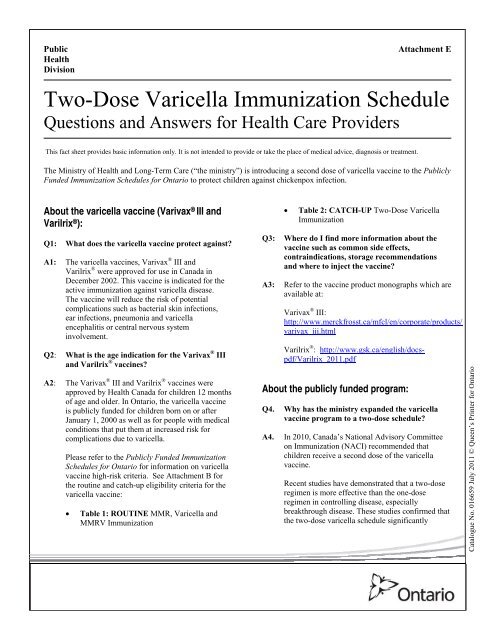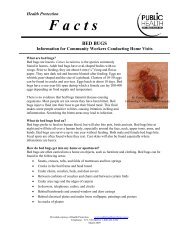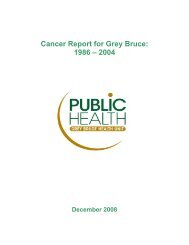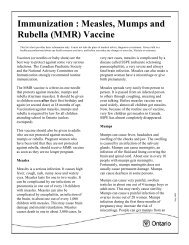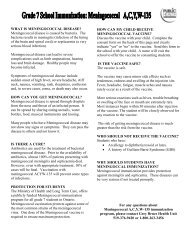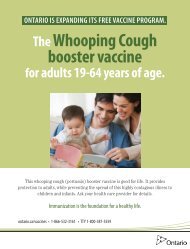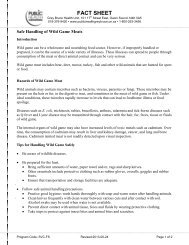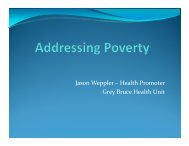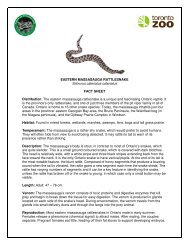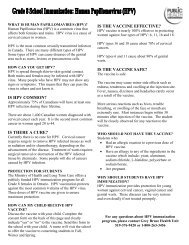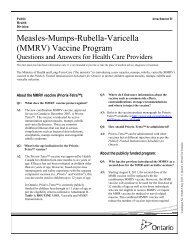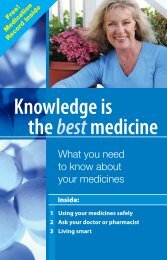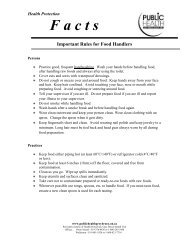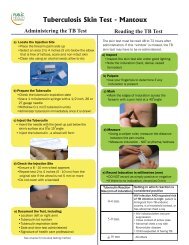Two-dose varicella program
Two-dose varicella program
Two-dose varicella program
Create successful ePaper yourself
Turn your PDF publications into a flip-book with our unique Google optimized e-Paper software.
Public<br />
Health<br />
Division<br />
Attachment E<br />
<strong>Two</strong>-Dose Varicella Immunization Schedule<br />
Questions and Answers for Health Care Providers<br />
This fact sheet provides basic information only. It is not intended to provide or take the place of medical advice, diagnosis or treatment.<br />
The Ministry of Health and Long-Term Care (“the ministry”) is introducing a second <strong>dose</strong> of <strong>varicella</strong> vaccine to the Publicly<br />
Funded Immunization Schedules for Ontario to protect children against chickenpox infection.<br />
About the <strong>varicella</strong> vaccine (Varivax ® III and<br />
Varilrix ® ):<br />
Q1: What does the <strong>varicella</strong> vaccine protect against<br />
A1: The <strong>varicella</strong> vaccines, Varivax ® III and<br />
Varilrix ® were approved for use in Canada in<br />
December 2002. This vaccine is indicated for the<br />
active immunization against <strong>varicella</strong> disease.<br />
The vaccine will reduce the risk of potential<br />
complications such as bacterial skin infections,<br />
ear infections, pneumonia and <strong>varicella</strong><br />
encephalitis or central nervous system<br />
involvement.<br />
Q2: What is the age indication for the Varivax ® III<br />
and Varilrix ® vaccines<br />
A2: The Varivax ® III and Varilrix ® vaccines were<br />
approved by Health Canada for children 12 months<br />
of age and older. In Ontario, the <strong>varicella</strong> vaccine<br />
is publicly funded for children born on or after<br />
January 1, 2000 as well as for people with medical<br />
conditions that put them at increased risk for<br />
complications due to <strong>varicella</strong>.<br />
Please refer to the Publicly Funded Immunization<br />
Schedules for Ontario for information on <strong>varicella</strong><br />
vaccine high-risk criteria. See Attachment B for<br />
the routine and catch-up eligibility criteria for the<br />
<strong>varicella</strong> vaccine:<br />
• Table 1: ROUTINE MMR, Varicella and<br />
MMRV Immunization<br />
• Table 2: CATCH-UP <strong>Two</strong>-Dose Varicella<br />
Immunization<br />
Q3: Where do I find more information about the<br />
vaccine such as common side effects,<br />
contraindications, storage recommendations<br />
and where to inject the vaccine<br />
A3: Refer to the vaccine product monographs which are<br />
available at:<br />
Varivax ® III:<br />
http://www.merckfrosst.ca/mfcl/en/corporate/products/<br />
varivax_iii.html<br />
Varilrix ® : http://www.gsk.ca/english/docspdf/Varilrix_2011.pdf<br />
About the publicly funded <strong>program</strong>:<br />
Q4. Why has the ministry expanded the <strong>varicella</strong><br />
vaccine <strong>program</strong> to a two-<strong>dose</strong> schedule<br />
A4. In 2010, Canada’s National Advisory Committee<br />
on Immunization (NACI) recommended that<br />
children receive a second <strong>dose</strong> of the <strong>varicella</strong><br />
vaccine.<br />
Recent studies have demonstrated that a two-<strong>dose</strong><br />
regimen is more effective than the one-<strong>dose</strong><br />
regimen in controlling disease, especially<br />
breakthrough disease. These studies confirmed that<br />
the two-<strong>dose</strong> <strong>varicella</strong> schedule significantly<br />
Catalogue No. 016659 July 2011 © Queen’s Printer for Ontario
educed the rate of <strong>varicella</strong> breakthrough cases<br />
and increased vaccine efficacy.<br />
A second <strong>dose</strong> of the <strong>varicella</strong> vaccine should help<br />
to improve protection, decrease <strong>varicella</strong> cases by<br />
22% 1 , which in turn will reduce the number of<br />
children who suffer complications from<br />
chickenpox.<br />
<strong>Two</strong> <strong>dose</strong>s of the <strong>varicella</strong> vaccine are now<br />
recommended as part of the childhood schedule<br />
where, previously, only one <strong>dose</strong> was<br />
recommended.<br />
Q5: What is the epidemiology of <strong>varicella</strong> in<br />
Ontario<br />
A5: Varicella is mainly a childhood disease that<br />
develops in 50% of unvaccinated Canadian-born<br />
children before they reach five years of age and in<br />
90% of unvaccinated children before 12 years of<br />
age. In Ontario, chickenpox infection is<br />
underreported. However, limited available data<br />
shows that, since the introduction of the one-<strong>dose</strong><br />
<strong>varicella</strong> vaccine in 2004, there have been 32,135<br />
cases of chickenpox reported.<br />
Eight hundred and fifty-six of these cases were<br />
severe, resulting in health complications,<br />
hospitalization or death. Since 2008, approximately<br />
7,400 cases of <strong>varicella</strong> have been reported<br />
annually in Ontario, showing a 23% reduction in<br />
the number cases since 2004.<br />
An Ontario study by Kwong et al., published in<br />
2008, assessed the effect of private availability of<br />
<strong>varicella</strong> vaccines and subsequent implementation<br />
of a publicly funded vaccination <strong>program</strong> on<br />
<strong>varicella</strong>-related hospitalizations, emergency<br />
department use and visits to physicians’ offices.<br />
This study found that the introduction of the<br />
publicly funded <strong>varicella</strong> immunization <strong>program</strong> in<br />
Ontario was associated with greater declines in<br />
<strong>varicella</strong>-related health care use.<br />
Q6: Who is eligible to receive the publicly funded<br />
univalent <strong>varicella</strong> vaccine and when should<br />
they receive it<br />
A6: Refer to the eligibility criteria as outlined in<br />
Attachment B:<br />
• Table 1: ROUTINE MMR, Varicella and<br />
MMRV Immunizations<br />
• Table 2: CATCH-UP <strong>Two</strong>-Dose Varicella<br />
Immunization<br />
Q7. What is the recommended schedule for<br />
children to receive two <strong>dose</strong>s of <strong>varicella</strong><br />
vaccine or <strong>varicella</strong>-containing vaccine<br />
A7. Starting August 8 2011, a second <strong>dose</strong> of the<br />
<strong>varicella</strong> vaccine will be routinely offered to<br />
children at four years of age in the form of the<br />
MMRV (measles, mumps, rubella and <strong>varicella</strong>)<br />
vaccine. However, the monovalent <strong>varicella</strong>-only<br />
vaccine will continue to be used for the first <strong>dose</strong><br />
at 15 months of age as well as for those<br />
individuals who are not eligible to receive the<br />
MMRV or require the <strong>varicella</strong>-only vaccine for<br />
medical or travel related reasons.<br />
As part of the catch-up <strong>program</strong> for the second<br />
<strong>dose</strong> of <strong>varicella</strong> vaccine, children born on or<br />
after January 1, 2000 who have already received<br />
two <strong>dose</strong>s of the MMR (measles, mumps and<br />
rubella) vaccine and one <strong>dose</strong> of the <strong>varicella</strong><br />
vaccine will be eligible to receive a second <strong>dose</strong><br />
of <strong>varicella</strong> vaccine.<br />
According to the National Advisory Committee<br />
on Immunization (NACI), the minimal interval<br />
between two monovalent <strong>varicella</strong> vaccines and<br />
between a monovalent <strong>varicella</strong> vaccine and the<br />
MMRV (measles, mumps, rubella and <strong>varicella</strong>)<br />
vaccine should be three months.<br />
Parents, in consultation with their health care<br />
provider, may have their children immunized<br />
with MMR and <strong>varicella</strong> as separate vaccines if<br />
there are existing medical reasons or if the child<br />
will be travelling outside Canada prior to his/her<br />
fourth birthday when he/she becomes eligible for<br />
the MMRV vaccine.<br />
Q8: What are the detailed schedules for children<br />
who have not completed or have not started<br />
their MMR or <strong>varicella</strong> immunization series<br />
A8: See detailed schedules for MMR, MMRV and<br />
Varicella immunization series outlined in<br />
Attachment B - Table 3: RECOMMENDED<br />
vaccines and <strong>dose</strong>s required to complete measles,<br />
mumps, rubella and <strong>varicella</strong> immunization series.<br />
1 Brisson, M., Gurgen, K., Drolet, M. et al. Modelling the<br />
impact of one- and two-<strong>dose</strong> <strong>varicella</strong> vaccination on the<br />
epidemiology of <strong>varicella</strong> and zoster. Vaccine 2010;<br />
28(19):3385-3397.<br />
2
Q9. What happens if a child receives his/her first<br />
<strong>dose</strong> of <strong>varicella</strong> vaccine prior to 12 months of<br />
age Will the second <strong>dose</strong> provide the needed<br />
immunity<br />
A9. If the first <strong>dose</strong> of <strong>varicella</strong> vaccine was given<br />
before the child's first birthday, the child should<br />
receive two additional <strong>dose</strong>s of <strong>varicella</strong> after<br />
his/her first birthday with appropriate intervals<br />
between <strong>dose</strong>s and other live (e.g. MMR)<br />
vaccines.<br />
Q10. Are all children eligible for the second <strong>dose</strong> of<br />
<strong>varicella</strong> or are only those who are still<br />
susceptible eligible (Please also see Q11)<br />
A10. Children who have evidence of immunity to<br />
<strong>varicella</strong> do not need the vaccine.<br />
Persons are generally considered to be immune if<br />
they have any of the following:<br />
• documentation of two age-appropriate <strong>dose</strong>s<br />
of <strong>varicella</strong> vaccine;<br />
• laboratory confirmation of immunity or<br />
infection; or<br />
• diagnosis or verification of a history of<br />
<strong>varicella</strong> disease by a health care provider.<br />
Individuals do not need the <strong>varicella</strong> vaccine, if<br />
they meet any of the above criteria. If immunity<br />
is unknown, it is still safe and the child is<br />
eligible to receive the vaccine even if he/she<br />
previously had chickenpox.<br />
Q11. If a child has a history of chickenpox prior to<br />
one year of age should he/she receive the<br />
<strong>varicella</strong> vaccine<br />
A11. Children with a history of chickenpox prior to<br />
one year of age are eligible to receive two <strong>dose</strong>s<br />
of the vaccine at 15 months and four years of<br />
age. Since the clinical presentation of<br />
chickenpox during the first year of life may not<br />
be typical due to maternally acquired antibody, it<br />
may be difficult to determine whether infection<br />
occurred.<br />
Q12: Who should not receive the <strong>varicella</strong> vaccine<br />
A12: Children should not receive the vaccine if they<br />
have:<br />
• allergies to the vaccine or any component of<br />
the vaccine;<br />
• an anaphylactic reaction to a prior <strong>dose</strong> of<br />
the vaccine; or<br />
• known allergies to neomycin or gelatine.<br />
Special considerations are needed for children<br />
who have:<br />
• a weakened immune systems or those on<br />
medications that suppress their immune<br />
system;<br />
• severe acute febrile illness (administration<br />
of MMRV should be postponed; however,<br />
vaccination can occur if the individual has a<br />
minor infection); or<br />
• received Immune Globulin or blood<br />
products (vaccination should be delayed for<br />
three to 11 months).<br />
Note: Pregnant women or women trying to get<br />
pregnant should not be vaccinated. According to<br />
the vaccine manufacturer, pregnancy should be<br />
avoided for at least three months after<br />
vaccination.<br />
Q13: What is the vaccine ordering process<br />
A13: Order the vaccine through your regular vaccine<br />
supply source (i.e. local public health unit or the<br />
Ontario Government Pharmaceutical and<br />
Medical Supply Service [OGPMSS]).<br />
Q14: How should the monovalent <strong>varicella</strong> vaccine<br />
be stored<br />
A14: In order to ensure that children receive optimal<br />
protection, monovalent <strong>varicella</strong> vaccine (like<br />
other vaccines) must be maintained at a<br />
temperature between +2°C and +8°C from the<br />
time of manufacture until the vaccines are<br />
administered to individuals. This temperature<br />
must be monitored and maintained at all times.<br />
Q15: What should be done for adverse events<br />
following immunization (AEFIs)<br />
A15: Under section 38 of the Health Protection and<br />
Promotion Act, R.S.O. 1990, physicians or<br />
other persons authorized to administer an<br />
immunizing agent are required to inform the<br />
person who consents to immunization of the<br />
importance of immediately reporting to a<br />
health care provider any reaction that may be a<br />
reportable event. Local public health units<br />
should subsequently be notified of the adverse<br />
event.<br />
The AEFI reporting form can be found on the<br />
Public Health Agency of Canada website along<br />
with a User Guide at: www.phacaspc.gc.ca/im/aefi-form-eng.php.<br />
Send the<br />
3
References:<br />
completed form to your local public health<br />
unit.<br />
A list of health units can be found at:<br />
www.health.gov.on.ca/english/public/contact/p<br />
hu/phuloc_mn.html.<br />
1. Public Health Agency of Canada. (2006). Canadian<br />
Immunization Guide (7 th ed.).<br />
2. Kuter et al. (2004), Ten year follow-up of healthy<br />
children who received one or two injections of<br />
<strong>varicella</strong> vaccine. Pediartic Infectious Diseases<br />
Journal, 23, 132-37.<br />
3. Kwong, J.C., Tanuseputro, P., Zagorski, B.,<br />
Moineddin, R. & Chan, K.J. (2008). Impact of<br />
<strong>varicella</strong> vaccination on health care outcomes in<br />
Ontario, Canada: Effect of a publicly funded<br />
<strong>program</strong> Vaccine, 26, 6006-12.<br />
4. National Advisory Committee on Immunization<br />
(NACI). Varicella vaccination two-<strong>dose</strong><br />
recommendations. Canadian Communicable Disease<br />
Report. 2010; 36; 1-26. Available from<br />
http://www.phac-aspc.gc.ca/publicat/ccdrrmtc/10vol36/acs-8/index-eng.php<br />
5. Vaccine Product Monograph; Varivax ® III, Merck<br />
Frosst Canada Ltd., July 20, 2005.<br />
http://www.novaccine.com/pdffiles/VARIVAX_III_p<br />
ackage_insert.pdf<br />
6. Vaccine Product Monograph; Varilrix ® ,<br />
GlaxoSmithKline Inc., October 2010.<br />
http://www.gsk.com.au/products_vaccines_detail.asp<br />
xview=26<br />
4


